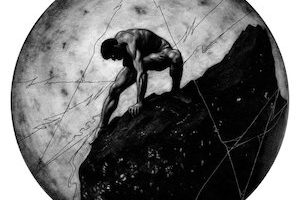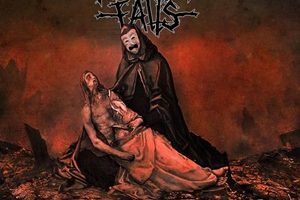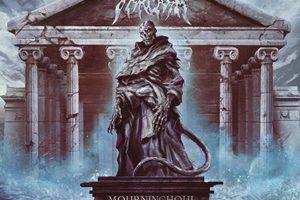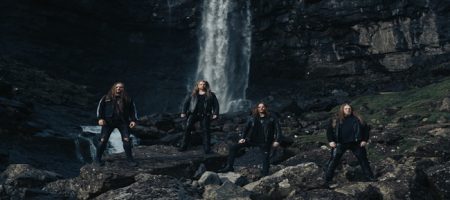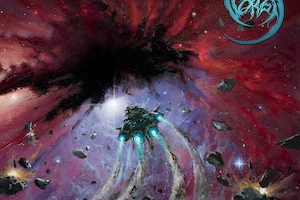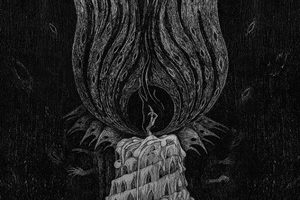Primordial – The End Is Near
Sunday, 24th September 2023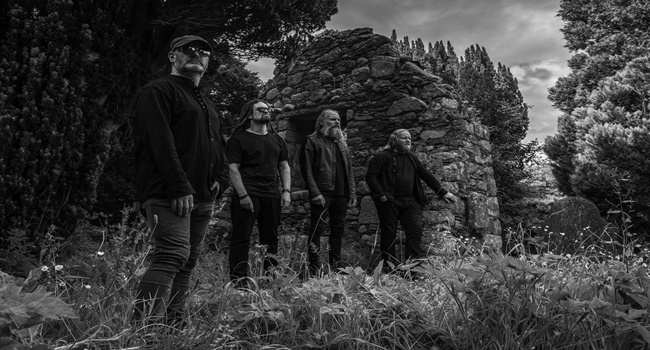
Photo: Fergal Flannery
With over thirty years invested as a group, Irish veterans Primordial are a reliable force when it comes to Celtic folk/black metal. Epic songwriting, cultural aural tapestry, lyrical content surrounding history, heritage, and the struggles of the common man – it doesn’t get more emotional than this. How It Ends is the tenth studio record and first post-pandemic – keeping the band striding valiantly into these years in a more aggressive, open way. We reached out to vocalist A.A. Nemtheanga to catch up on the new record, thoughts on choosing singles, studio to stage preferences, discussion of his podcast, his interesting history course work he would set up for both Americans and Europeans to learn more about each other, and what’s on tap for the next few tour/live festival outings.
Dead Rhetoric: The latest Primordial studio record is How It Ends – writing the album in the fall of 2022 and letting the record once again come together naturally. You did want to achieve a bigger, aggressive, and more open sound – at this point in the career of the band, what factors shape the idea generation and songwriting outlook – plus where do you see this record sitting in the discography of the band?
A.A. Nemtheanga: Well, we don’t really think about things like that too much. We just basically do what we do when you have to do it. We began in earnest last September writing, we thought from that point in it was going to take five or six months to get everything together. We would then book the studio and then plan towards putting together album number ten.
As far as where it sits in the canon – it’s too early to tell. That we got to ten albums is quite incredible really when I think about it. You have to just trust in your instincts when you are writing songs. We are not a band that plans things out a lot. We are a band that’s very instinctual when it comes to the writing and playing.
Dead Rhetoric: Did the pandemic have an effect on galvanizing the creativity at first for this material – or was it hard to get out of the mindset of what was going on to be able to be creative for this record?
Nemtheanga: Uh no – we did absolutely nothing during the pandemic. We couldn’t get together; we couldn’t go to rehearsals anyway. We put the band on the shelf at that moment. We don’t trade files; we don’t write online. That was just the case of putting the band on a dusty shelf and just waiting to see when we could take it down and do some work. And of course, things are not as they once were, It’s too easy to say here we are, but that’s what happened.
Dead Rhetoric: You always want to give the listeners deep lyrical content that makes people think – and in this case your draw from historical and modern ideas regarding the fight for liberty, freedom of speech, and independence among others for this record. Can you discuss what you wanted to get across for the themes – and how it parallels the musical atmosphere?
Nemtheanga: The album To the Nameless Dead was about the movement of empire. That was an album about people’s set worth, by the movement of borders, establishments, empire as I said. This current album is one that Johnny Cash would say is for the downtrodden, the outsider, the outlaw, the rebel who is defiant. Our relationship to liberty, all of those kinds of things. It’s not a state of the union modern address. It’s steeped in sort of historical context, but it can be prescient to the strange times that we live in today that we seem to be sleepwalking into. It’s a sort of a warning from the present day to the future – we are not really a say what you see kind of band. Certainly, most of the thematic revolves the concepts of that.
Dead Rhetoric: Were there certain tracks on this record that came easier to develop than others – or ones that may have been more challenging to work through?
Nemtheanga: There’s always some songs that come together easier than others. “Call to Cernunnos” took twenty minutes to write, some songs are harder to craft. We come into the studio in the morning and look at the big school board, chalkboard that we chart out song structures, and that can be similar to work from album to album when it comes to discipline. You can have some songs as a result that can be a bit more elusive to come together.
Dead Rhetoric: Is it also a discussion between the band and the label to figure out which songs to premiere as singles?
Nemtheanga: No, not really. Sometimes (the label) will make suggestions, I guess. It’s difficult, because once you pick the singles those are the songs that tend to be in the setlist for live shows. Sometimes great songs get forgotten, especially when you have so many albums and so many songs. You want to have more stage time, but you haven’t got the time to do them all. Personally, I would have picked three slightly different singles, it is what it is. The first song we released, while not necessarily being my favorite on the album, thematically it fits.
Dead Rhetoric: What does Chris Fielding’s work over the years mean to Primordial, as he works with you again in an engineering capacity for this record? Are there specific elements or aspects that he is able to provide to get the desired final results as far as sound, tones, etc.?
Nemtheanga: He made two records with us before. Chris is just a great guy. He works very hard, he’s got an ear for Primordial, as we are kind of a simplistic band. We don’t have tempo maps, we don’t use Autotune, we don’t have anything like this. We try to establish our own style in an analog kind of way. It’s very traditional, and he’s able to capture things in a very traditional way. We wanted to try and make things hassle free.
Dead Rhetoric: You’ve been a part of the Metal Blade roster since 2005’s The Gathering Wilderness. What are your thoughts on the label, their global staff, and how they have promoted the efforts of Primordial over the decades?
Nemtheanga: Yeah, it’s a great relationship. It’s an unusual label for us, I don’t think there’s anything else quite like Primordial on the label, which I think is good. It makes us stand out. We have a genuine sense of independence. To be honest, in 2023 the nature of the game has changed, there isn’t as much physical product, and a lot of bands see the opportunity to do more things by themselves. Bands now are required to be their own promotion, you have to do Instagram, you have to do YouTube, you have to do all this social media. This industry just keeps shifting and changing. Primordial is an old-fashioned band, and the label hasn’t told us that we should try to be this, that, and the other thing. It’s a good relationship.
Dead Rhetoric: Do you try to work hand in hand with them for a lot of the special physical editions of the record?
Nemtheanga: Yes, I compiled the second bonus CD for the new album. I take all of the artwork, the ideas and the photographs originally come from me. We work pretty closely. The world is changing, the nature of even special editions is changing because of the costs in production, costs in shipping. A really nice wooden box that would have been made ten years ago now would cost financially more. That’s the same though with every industry.
Dead Rhetoric: How has Primordial handled the ever-changing musical landscape – as when you first started out, the promotion and push of a record was very different than it is today?
Nemtheanga: What can we do? We resist most things on our own in a micro kind of way. We try not to get caught up in it, but at the same time I find myself having to do things when they say, ‘hey – can you update your BandsinTown?’… oh, okay. It’s another website I have to be in charge of. You find that if you are the so-called administrator within the band, having to clock into twelve different platforms each week, and you are not being paid for any of them. You are sort of like a caretaker. Some people in bands have it easier, they have someone else taking care of that stuff. It’s tiresome, because at one time the promotion of these sites would be on the shoulders of the label. The label is now requiring you to do that job. They may ask you why you don’t have a TikTok channel. There are not enough hours in the day for me to get involved in more platforms. Platforms that would suck my entire energy.
So, it’s a complex balance. That’s just the way life is.
Dead Rhetoric: How has your relationship with your fellow bandmates evolved over the years?
Nemtheanga: We are still friends, and we are not tired of each other. We still hang out from time to time. It’s quite a good gang of people, and after thirty years that says a lot. We have an Irish take on things, we say what we say, express yourself, and nobody holds any words with each other to fight and argue. We are in a long-term relationship.
Dead Rhetoric: You also have a podcast called Agitators Anonymous – what do you enjoy most about this medium, and do you believe it’s a great avenue to get your thoughts out on numerous subjects in a healthy way?
Nemtheanga: Yes, I’d say so. I started this in lockdown, and it was a measure of coping with what was happening, so it grew into its own. It gets quite a lot of listeners for what it is. People enjoy the fact that last week it was about the Haitian revolution, and there’s history about Aleister Crowley, things in Afghanistan, or there could be stories about touring. You never know quite what it’s about. I try to think about the principles of skepticism being the only rational perspective, to hold the line between the so-called binary choices that people tend to be given. I try to provide context, nuance, and guidance while also thinking about the other side. Speak out about some things – in Ireland for instance we have a new hate speech legislation bill that is going to criminalize intent, and this is dangerous. It’s important on some small level to speak out about these things.
I also like to tell stories and try to make people laugh sometimes. I have done about 180 episodes, have a listen. The podcast is there to provide a voice. It’s a force for positivity, at least for me. I think some listeners are surprised by some of my attitudes and it’s good to be confounded. Sometimes I speak completely off the cuff for an hour, sometimes I have notes.
Dead Rhetoric: Where do you see the greatest differences between the studio and the stage when it comes to Primordial? Do you have a preference for one over the other – or are both equally enjoyable for different, distinct reasons?
Nemtheanga: No, I prefer the stage. I’m not one to have patience for the studio, being in there for hours. Some people love it, I like it – but I want spontaneity, the adrenaline rush. Spending all day in the studio going over and over things, that’s hard. Some songs are one take, I put hard work in and if it sounds good, we take it. The stage is the reward – the touring, the traveling. That’s my reward for the patience of working on a record.
Dead Rhetoric: With ten albums to choose from, does it become even more of a challenge to decide what gets put in a set list for Primordial – even in a headline situation?
Nemtheanga: Yeah, it’s really hard. Especially when the songs are six, seven, eight, nine minutes long. You get 45 minutes in a festival situation, so that’s six songs, maybe. People on the side of the stage are looking at their watch with one minute left and you have six minutes left in the song. It’s not easy, sometimes you wish you were like The Misfits.
Dead Rhetoric: If you had the opportunity to create a high school or college level course about any subject outside of music, what would you like to teach and why do you think this subject matter is important to learn?
Nemtheanga: That’s a very interesting question. It’s complicated. I suppose we need more courses that debunk the idea that many things are conspiracy theories. People use that phrase to shut down conversations, that might be necessary. It’s hard to imagine this without coming back to identity politics. It might be helpful for Americans to know a bit more about their history of their European ancestors. This might allow them to have more insight into using phrases of privilege and things like that. To understand Irish history, it’s very dark, it’s very grim. To understand the nature of people and where/what they came from might be important.
In Europe for example, we don’t really learn much about American history. We get it from 1960 on. I never really understood about the founding of America. A sort of cross-cultural, historical understanding way. We use words like privilege all the time. The privilege of a working-class person in 1850 or 1900 was pretty grim, it was nonexistent. If you were to go back to the medieval period before the industrial revolution, that was a society of structural, inherited elitism. A poor person in 1800 was a poor person pretty much the world over, and they died in a short life. There’s this misconception about the Irish and Italians when they came to America – they were escaping incredible poverty.
Dead Rhetoric: How do you feel about the state of the metal music industry? What excites you, and what changes would you like to make for the greater good of all?
Nemtheanga: Equity from streaming would be a start. If I could pay my rent every month from streaming, that would be great. I can’t even buy a pint. There’s no way the platforms will do that. If Spotify would allow direct access to people to sell them some shirts, let them know about shows, it would be very helpful, but they don’t. The only way bands can get any income is to be on tour, becoming a traveling t-shirt salesman.
Dead Rhetoric: What’s on the agenda for Primordial over the next year or so as far as promotion, touring, festivals, etc.?
Nemtheanga: We have a big tour coming up with Paradise Lost in Europe. And then we are playing next year the Maryland Death Fest, we will come over for a week and do some US shows, the first time in a long time. Thankfully some decent news to come play in America.











